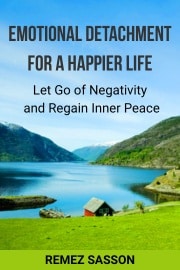
Look at the people around you, and you will discover that almost everyone seems to get emotionally involved with other people’s pains and problems. They get involved and are affected not only by close people but also by the problems of strangers.
Look, for example, at how parents feel about their children. They get anxious and stressed by what happens to them at school and with friends.
Sometimes, this goes too far, making the parents nervous, restless, and tense. This is an unhealthy situation, draining their strength and energy and preventing them from having a sound sleep at night.
We care about our children, other family members, friends, and colleagues.
That’s okay as long as you don’t cause yourself unnecessary emotional pain. Too much empathy does not help anyone, and it does not help you.
Be caring, loving, and helpful. It is possible to do so without burdening yourself with other people’s feelings.
You might say that you need to sympathize and empathize. Yes, you are right, but only up to a certain point.
A certain amount of empathy is okay, but when it becomes exaggerated, it causes unnecessary emotional pain and suffering.
You need to realize that everyone has his or her own life, with its ups and downs and things he or she has to deal with to grow and get stronger. You don’t need to solve everyone’s problems. What makes you think that you can do it better than them?
Too Much Empathy
Too much empathy does not help anyone, but it can make you unhappy and emotionally depleted. Helping others is a good thing to do, but taking their problems on your back is absolutely not necessary.
Imagine you see a friend of yours slipping and falling into a muddy puddle; what would you do, help him get out of the puddle or jump after him into the puddle in order to sympathize with him?
Would it help if both of you fall into the mud? Of course, it wouldn’t!
A certain amount of detachment always helps, and is not a sign of inconsideration.
A little detachment helps you be more practical and use common sense, and therefore, be of more help to others. It is a much more desirable situation than letting their ups and downs affect your moods and state of health.
Weekly lessons with stories, insights, and practical guidance to help you step beyond ordinary routines and awaken deeper awareness in daily life.
👉 Read a Sample Inner Awakening lesson
There is no reason in the world why you should take anything too personally. There is no reason in the world to take responsibility for everything that happens to other people.
Love your family and friends, and help them whenever you can. However, there is no need to be affected by what they say, think or go through. This is a sheer waste of energy and time, which makes you suffer.
Your mind doesn’t have to chatter all day.
There are simple ways to quiet the noise.
Calm Down the Nonstop Chatter of Your Mind
Join The Path to Awakening — A practical online meditation course that guides you step by step to inner peace, heightened awareness, and awakening beyond daily distractions.
👉Explore The Online Meditation Course
A little detachment does not mean that you become indifferent, uncaring and aloof. It is a totally practical attitude, and of greater help to the person with whom you empathize.
There are various ways to deal too much empathy. You can find these ways, together with guidance and advice in the book mentioned below.
This book that will show you how to develop emotional detachment and control too much unhealthy empathy. It will also help you maintain a state of calmness and self-control.
Read the book, and you will discover how to stop taking everything too personally and getting upset by what people say and do.


 Founder of SuccessConsciousness.com,
Founder of SuccessConsciousness.com,